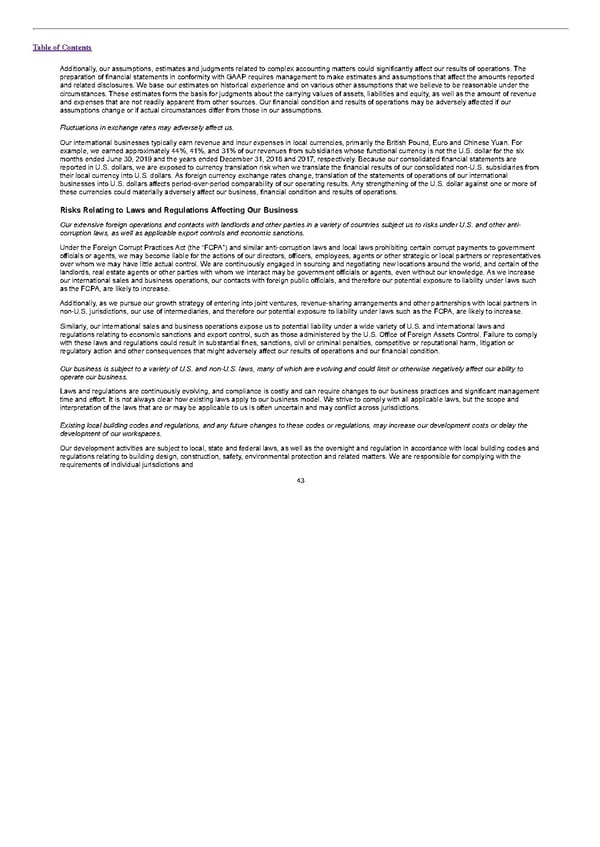Table of Contents Additionally, our assumptions, estimates and judgments related to complex accounting matters could significantly affect our results of operations. The preparation of financial statements in conformity with GAAP requires management to make estimates and assumptions that affect the amounts reported and related disclosures. We base our estimates on historical experience and on various other assumptions that we believe to be reasonable under the circumstances. These estimates form the basis for judgments about the carrying values of assets, liabilities and equity, as well as the amount of revenue and expenses that are not readily apparent from other sources. Our financial condition and results of operations may be adversely affected if our assumptions change or if actual circumstances differ from those in our assumptions. Fluctuations in exchange rates may adversely affect us. Our international businesses typically earn revenue and incur expenses in local currencies, primarily the British Pound, Euro and Chinese Yuan. For example, we earned approximately 44%, 41%, and 31% of our revenues from subsidiaries whose functional currency is not the U.S. dollar for the six months ended June 30, 2019 and the years ended December 31, 2018 and 2017, respectively. Because our consolidated financial statements are reported in U.S. dollars, we are exposed to currency translation risk when we translate the financial results of our consolidated non-U.S. subsidiaries from their local currency into U.S. dollars. As foreign currency exchange rates change, translation of the statements of operations of our international businesses into U.S. dollars affects period-over-period comparability of our operating results. Any strengthening of the U.S. dollar against one or more of these currencies could materially adversely affect our business, financial condition and results of operations. Risks Relating to Laws and Regulations Affecting Our Business Our extensive foreign operations and contacts with landlords and other parties in a variety of countries subject us to risks under U.S. and other anti- corruption laws, as well as applicable export controls and economic sanctions. Under the Foreign Corrupt Practices Act (the “FCPA”) and similar anti-corruption laws and local laws prohibiting certain corrupt payments to government officials or agents, we may become liable for the actions of our directors, officers, employees, agents or other strategic or local partners or representatives over whom we may have little actual control. We are continuously engaged in sourcing and negotiating new locations around the world, and certain of the landlords, real estate agents or other parties with whom we interact may be government officials or agents, even without our knowledge. As we increase our international sales and business operations, our contacts with foreign public officials, and therefore our potential exposure to liability under laws such as the FCPA, are likely to increase. Additionally, as we pursue our growth strategy of entering into joint ventures, revenue-sharing arrangements and other partnerships with local partners in non-U.S. jurisdictions, our use of intermediaries, and therefore our potential exposure to liability under laws such as the FCPA, are likely to increase. Similarly, our international sales and business operations expose us to potential liability under a wide variety of U.S. and international laws and regulations relating to economic sanctions and export control, such as those administered by the U.S. Office of Foreign Assets Control. Failure to comply with these laws and regulations could result in substantial fines, sanctions, civil or criminal penalties, competitive or reputational harm, litigation or regulatory action and other consequences that might adversely affect our results of operations and our financial condition. Our business is subject to a variety of U.S. and non-U.S. laws, many of which are evolving and could limit or otherwise negatively affect our ability to operate our business. Laws and regulations are continuously evolving, and compliance is costly and can require changes to our business practices and significant management time and effort. It is not always clear how existing laws apply to our business model. We strive to comply with all applicable laws, but the scope and interpretation of the laws that are or may be applicable to us is often uncertain and may conflict across jurisdictions. Existing local building codes and regulations, and any future changes to these codes or regulations, may increase our development costs or delay the development of our workspaces. Our development activities are subject to local, state and federal laws, as well as the oversight and regulation in accordance with local building codes and regulations relating to building design, construction, safety, environmental protection and related matters. We are responsible for complying with the requirements of individual jurisdictions and 43
 S1 - WeWork Prospectus Page 47 Page 49
S1 - WeWork Prospectus Page 47 Page 49